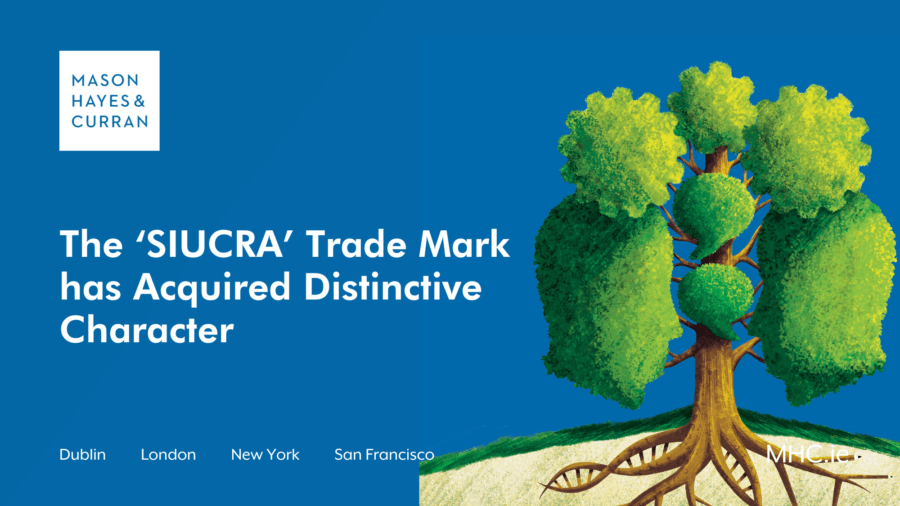
The Cancellation Division of the EUIPO handed down a decision in September 2022, finding that the Irish word for ‘sugar’ could be registered as a trademark. Holger Huber brought an application for a declaration of invalidity against the EUTM ‘SIUCRA’ registered by Nordzucker (Ireland) Limited (Nordzucker) under Class 30 for sugar products.
The application, which was ultimately rejected in its entirety, was made based on the following arguments:
Deceptiveness
Holger Huber argued that for goods not containing sugar, the trade mark would deceive the public as to the nature of the goods. The EUTM proprietor, Nordzucker, claimed the argument was not relevant as the goods covered by the mark were either sugar or products made from sugar. In addition, the trade mark was used in conjunction with specific product descriptors such as ‘granulated sugar’, ‘caster sugar’, etc. Therefore, there was no doubt that fluent Irish / Gaelic speakers would identify ‘SIUCRA’ as the brand of sugar while the English descriptor would be understood to be the product name.
The Cancellation Division rejected Holger Huber’s argument. They concluded that the goods covered by the registration are sugar or at least included sugar as a main ingredient and the mark was, therefore, not deceptive.
Descriptiveness & non-distinctiveness
Holger Huber argued that ‘SIUCRA’ was merely the word for ‘sugar’ in Gaelic and therefore, it consisted exclusively of descriptive indications and lacked any distinctive character. On the other hand, the proprietor, Nordzucker, provided market research to suggest that the mark had widespread recognition by most Irish consumers. Nordzucker exhibited surveys to exemplify that consumers recognised the name as being a ‘source indicator’ rather than being merely descriptive or generic. Despite this, the Cancellation Division found in favour of Holger Huber and agreed that the mark was descriptive and non-distinctive for all of the goods it was being used for.
Customary character
Holger Huber considered the term ‘SIUCRA’ to be customary in the Irish language and argued this was another ground for the invalidity declaration to be issued. However, the Cancellation Division found that as the contested mark was descriptive, its use is not customary because its descriptive character is inherent to its meaning and not to its use. Holger Huber’s argument was rejected.
Acquired distinctiveness
The potential refusal or invalidity of a mark on the basis that it is descriptive and non-distinctive can be overcome. If a mark has become distinctive as a result of its use, the mark can remain valid. The burden is placed on the proprietor to show that their mark has acquired distinctive character.
Factors to consider in this evaluation are:
- The market share held by the mark
- How geographically widespread and long-standing the use of the mark has been
- The amount invested by the proprietor in promoting the mark, and
- The proportion of the relevant class of persons who, because of the mark, identify the goods as being from that particular company.
Nordzucker sought to rely on evidence related to the figurative ‘SIUCRA’ mark, even though the application against them was in relation to their word mark. The Cancellation Division found that the figurative characteristics of the mark did not distract the public’s attention away from the word element of the mark and therefore, allowed the proprietor to rely on this evidence. The surveys exhibited by the proprietor showed that there was a very high spontaneous recall of the brand by consumers. Irish consumers were able to recognise the mark as being a ‘source indicator’ rather than being solely descriptive or generic. In fact, the surveys showed that the mark was by far the most well-known sugar brand amongst adults.
Conclusion
The Cancellation Division concluded that although the mark was descriptive and non-distinctive, this did not mean it could not acquire distinctiveness through its use. As the mark had acquired distinctive character for ‘sugar’, it had also acquired distinctive character for ancillary goods where sugar was the basic ingredient. On that basis, the application for a declaration of invalidity was rejected and the mark remains registered.
This case reiterates the stance already taken in both national and EU legislation. Brand owners should proceed with caution when registering trade marks that are merely descriptive and/or non-distinctive. However, doing so does not mean their trade mark will be automatically refused or ruled invalid. If brands can show their mark has acquired distinctiveness through use, they can overcome this obstacle. The onus is on the proprietor to prove this acquired distinctiveness.
For expert advice on successfully protecting your organisation's IP rights, contact a member of our Intellectual Property team.
The content of this article is provided for information purposes only and does not constitute legal or other advice.




